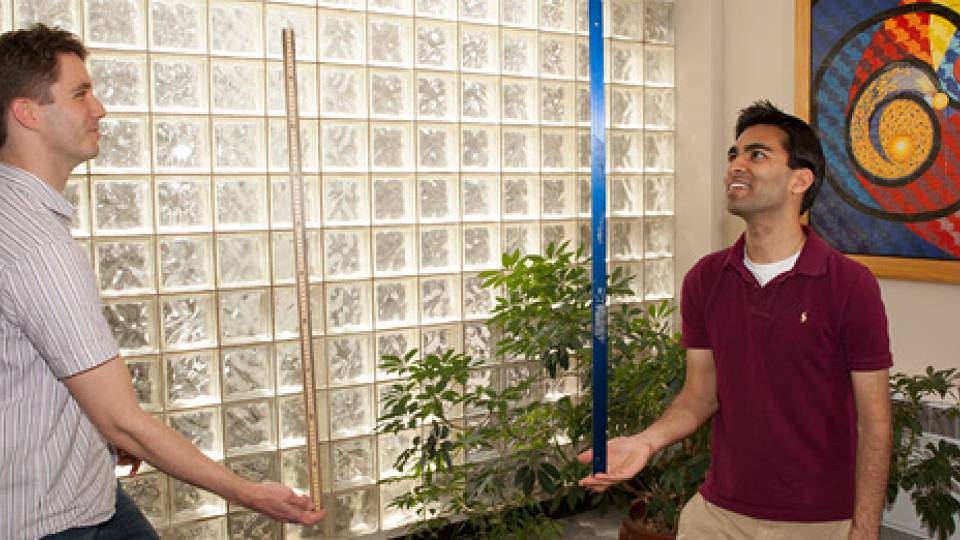Three Princeton University students with diverse interests in computer networks, machine learning and the basic physical processes of the brain were among 15 recipients of this year’s Hertz Fellowship for graduate studies in the sciences.
The students — Amy Ousterhout and Aman Sinha, seniors, and Daniel Strouse, a first-year graduate student in physics — were selected from among 700 applicants nationwide, the Fannie and John Hertz Foundation said. The fellowship, which provides support for up to five years, is valued at $250,000 and is awarded for studies in the applied physical, biological and engineering sciences.
Ousterhout, a computer science(Link is external) major from Palo Alto, Calif., began to pursue her interest in computer networks in her junior year after hearing of the widespread communications blockade instituted by the Egyptian government in response to the Arab Spring social movement. She developed a system that relies on short-range telecommunications methods to circumvent widespread censorship. Ousterhout built and tested a small prototype system, working with Jennifer Rexford, the Gordon Y.S. Wu Professor in Engineering, and Michael Freedman, an assistant professor of computer science.
The system uses Bluetooth or Wifi devices to quickly disseminate short “tweet-like” messages among users. Because the communications do not use conventional cellular networks or the Internet, they are far more difficult to block.
“The goal was to create an application that enabled communication without depending on any centralized infrastructure,” Ousterhout said.
Ousterhout, who has also been offered a fellowship by the National Science Foundation, plans to pursue a Ph.D. in computer science at the Massachusetts Institute of Technology, continuing her work in networks and distributed communications. A member of the engineering honor society Tau Beta Pi, she served as co-president of Princeton Women in Computer Science, executive web editor for The Daily Princetonian student newspaper, and as a leader for Princeton’s Outdoor Action program.
Two years ago, Ousterhout’s sister, Kay, a member of the Class of 2011, also received a Hertz Fellowship and is currently studying at the University of California-Berkeley.
Sinha, a mechanical and aerospace engineering(Link is external) major from Ivyland, Pa., also was named one of this year’s Churchill Scholars. After spending a year studying at the University of Cambridge as a Churchill Scholar, he plans to pursue a doctorate in electrical engineering at Stanford University.
At Princeton, Sinha has worked with Naomi Leonard, the Edwin S. Wilsey Professor of Mechanical and Aerospace Engineering, to study the ways that large groups of individual actors come together to make complex decisions. He explores the techniques that groups as disparate as flocks of birds or managers of power districts on an electric grid use to make collective decisions. The methods become particularly interesting, he said, when information among members is limited and the degree of uncertainty about the correct solution is high.
“The problem I am looking at, specifically, is how a group comes to a consensus,” he said.
Sinha, who will be the valedictorian for the Class of 2013 at Commencement, has won several academic awards as an undergraduate. Among others, he was the recipient of the George B. Wood Legacy Sophomore Prize, given to a junior for outstanding academic accomplishment the previous year, and the Barry M. Goldwater Scholarship, which is given to outstanding undergraduates concentrating in mathematics, the natural sciences and engineering.
Strouse, from Newark, Del., is concentrating in theoretical biophysics for his doctorate in physics(Link is external).
“I use tools from mathematics and physics to study the computations brains do and why,” Strouse said.
He received his bachelor’s degree from the University of Southern California (USC). He was a recipient of the Churchill Scholarship and spent a year studying in Cambridge before coming to Princeton at the start of this academic year to work with William Bialek, the John Archibald Wheeler/Battelle Professor in Physics and the Lewis-Sigler Institute for Integrative Genomics.
Strouse said his goal is to uncover the general rules that undergird biology in the same way that the laws of classical and quantum mechanics, electrodynamics and thermodynamics frame modern physics.
“We are searching for basic principles,” he said. “How are biological systems designed, and why are they this way?”
Strouse has worked on the role that a neuron’s dendrites play in learning and computation, how olfactory information is represented in the brains of mice, and how to optimize neural networks to respond quickly to new stimuli. His current work at Princeton is shifting more toward studying how animals make predictions and decisions in the face of uncertainty.
Strouse is a recipient of the U.S. Department of Energy’s Computational Sciences Graduate Fellowship.



